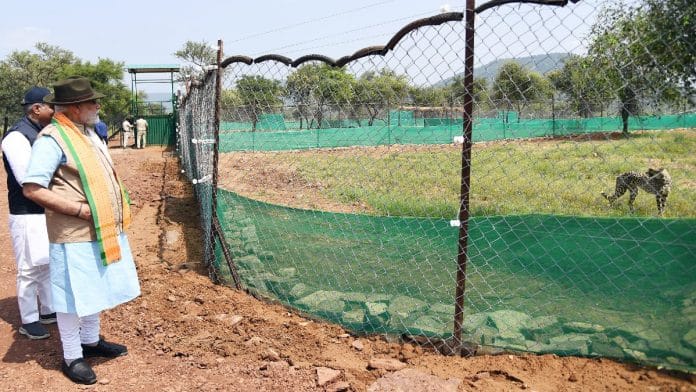New Delhi: Conservationists from India and abroad have raised concerns about the translocation of African cheetahs to the country. In a letter published in the journal Nature Ecology & Evolution Wednesday, conservationists from five countries called the project “ecologically unsound”, “costly” and one that “may serve as a distraction rather than help global cheetah and other science-based conservation efforts”.
On 17 September, eight cheetahs from Namibia were brought to India and released into Madhya Pradesh’s Kuno National Park with the intent of establishing a free-ranging population — a development that came 70 years after the Asiatic cheetah went extinct in India.
The plan has been decades in the making, with the government saying the relocation is an attempt to conserve the globally vulnerable cheetah and ameliorate India’s grassland ecosystems.
Experts from Namibia and South Africa who are involved with the project have expressed optimism about its outcomes. But the plan has divided conservationists across the world, many of whom feel the risks outweigh the possible benefits.
The letter published in Nature Ecology & Evolution was signed by 8 conservationists from South Africa, Portugal, the Netherlands, Australia, and India. It says that the translocation plan is based on “unsubstantiated” claims that the cheetahs have run out of space in Africa, that India has enough space for them, and that conservation translocations have been successful.
According to the letter, “cheetahs are characterised by disproportionately large home range sizes (over 750 sq km) and very low population densities (about 1 cheetah per 100 sq km)” and that the site for translocation — Kuno in Madhya Pradesh — “appears to have substantially overestimated cheetah carrying capacity”.
Kuno National Park is currently 748 sq. km in size and will host 20 cheetahs as part of the introduction plan. Apart from the eight Namibian cheetahs, India is expected to import another 12 from South Africa before the end of the year.
The cheetahs are being kept in fenced enclosures until they acclimatise to their new habitat. According to the Cheetah Action Plan prepared by the Wildlife Institute of India, they will then be released into the wild.
“The fenced-in cheetahs from Namibia are envisioned to soon move freely in India where average human population densities are 150 times higher. We anticipate that adopting such a speculative and unscientific approach will lead to human-cheetah conflicts, death of the introduced cheetahs or both, and will undermine other science-based species recovery efforts, both globally and within India,” the letter reads.
The authors recommend diverting investments to global cheetah conservation efforts elsewhere — such as in Iran, where cheetah populations are dwindling — or “radically revise” the current plan till India is better suited to host the cheetahs.
“We believe that there is an urgent need for international bodies, such as the IUCN and the wider community of cheetah and carnivore biologists, to re-evaluate the purpose and practice of such intercontinental, large carnivore translocation efforts,” the letter adds.
Also Read: ‘Mistakes will be made’: Why worries stalk India’s plans to bring back the cheetah
‘Not for Bambi lovers’
Authorities and conservationists involved in the translocation have said they expect high mortality rates within the first few years of the programme, but are optimistic about a positive outcome once the population stabilises.
“Doing a project like this is not easy. We always say it’s not for Bambi lovers, it’s very, very, very difficult. It’s difficult on the people who are doing the rewilding and rehabilitation. And it’s also very difficult on the different animals. Ideally, it’s better not to let an animal go extinct,” Laurie Marker of the Cheetah Conservation Fund had told ThePrint in an interview last month.
There are less than 7,000 adult cheetahs left in the wild globally, and they now inhabit less than 9 per cent of their original range.
According to the action plan, if the cheetahs don’t survive, fail to reproduce within 5 years, or the project doesn’t secure more habitats or funding for the project, it will “be reviewed for alternative strategies or discontinuation”.
(Edited by Uttara Ramaswamy)
Also Read: Cheetahs still in quarantine, but healthy, say officials 3 weeks after relocation






